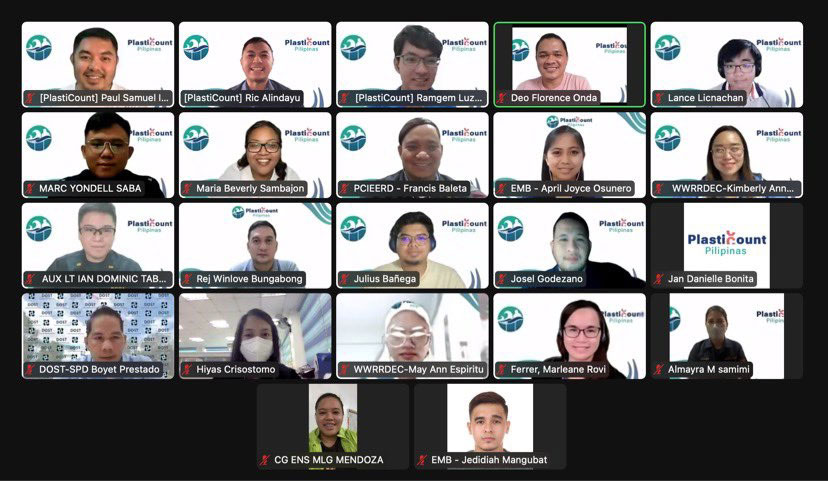The PlastiCount Project has officially launched its plastics training program for representatives of relevant National Government Agencies (NGAs) today, August 5, 2022 as part of the project’s objectives to foster capacity-building for NGAs involved in plastics research and monitoring. The online session was facilitated by Engr. Ricardo Alindayu II from the PlastiCount Team, while Project Leader Dr. Deo Florence Onda delivered an impassioned opening statement. Dr. Onda emphasized the significance of the project and the previous efforts towards researching plastic pollution in the country, remarking that based on their studies in the coastal areas of the West Philippine Sea “Plastic is everywhere. There is no place we visited (in WPS) that you don’t find plastics.” He explained that the amount of observed plastic pollution varies among different locations in the country and could be attributed to differences in economic activity, coastal population, and ocean connectivity. Moreover, Dr. Onda revealed that 60% of plastics collected from the remote Pag-asa Island in the West Philippine Sea were from different neighboring countries such as Thailand, Malaysia, Indonesia, Taiwan, China and Singapore based on brand audit, further solidifying the impact of ocean connectivity. Finally, the PlastiCount project leader stressed the importance of the active and collaborative cooperation between the science community and the relevant NGAs and encouraged all participants to work together towards an effective monitoring and management of our plastic pollution problem.
Participants then introduced themselves and their organization. They represent six different NGAs, namely: Philippine Coast Guard Marine Environmental Protection Command (PCG-METComm), Department of Science and Technology Philippine Council for Industry, Energy and Emerging Technology Research and Development (DOST-PCIEERD), as well as several bureaus and agencies of the Department of Environment and Natural Resources such as the Environmental Management Bureau (EMB), Biodiversity Management Bureau (BMB), as well as Ecosystems Research and Development Bureau (ERDB)’s Toxic and Hazardous Wastes Research, Development and Extension Center (THWRDEC) and Watershed and Water Resources Research, Development and Extension Center (WWRRDEC).
In an effort to provide a more open and collaborative atmosphere, the facilitator and Project Staff Dr. Paul Samuel Ignacio of UP Baguio encouraged the participants to share their expectations regarding the project’s facilitators, the training program itself and to pledge their commitment to the project. Based on the garnered responses from the participants, it is very apparent that they are very excited to be part of the project and learn from this training program. They also vowed to be participative and committed to the project.
With everyone on-board, Ramgem Luzadas from the PlastiCount Team discussed the project’s objectives and the schedule of activities involved therein, while PlastiCount Team’s Lance Licnachan discussed the deliverables for the upcoming session.
While the session was a success, it is only the first step in the project. A scoping and framework development session will be conducted face-to-face in the Marine Science Institute on August 9, 2022.

